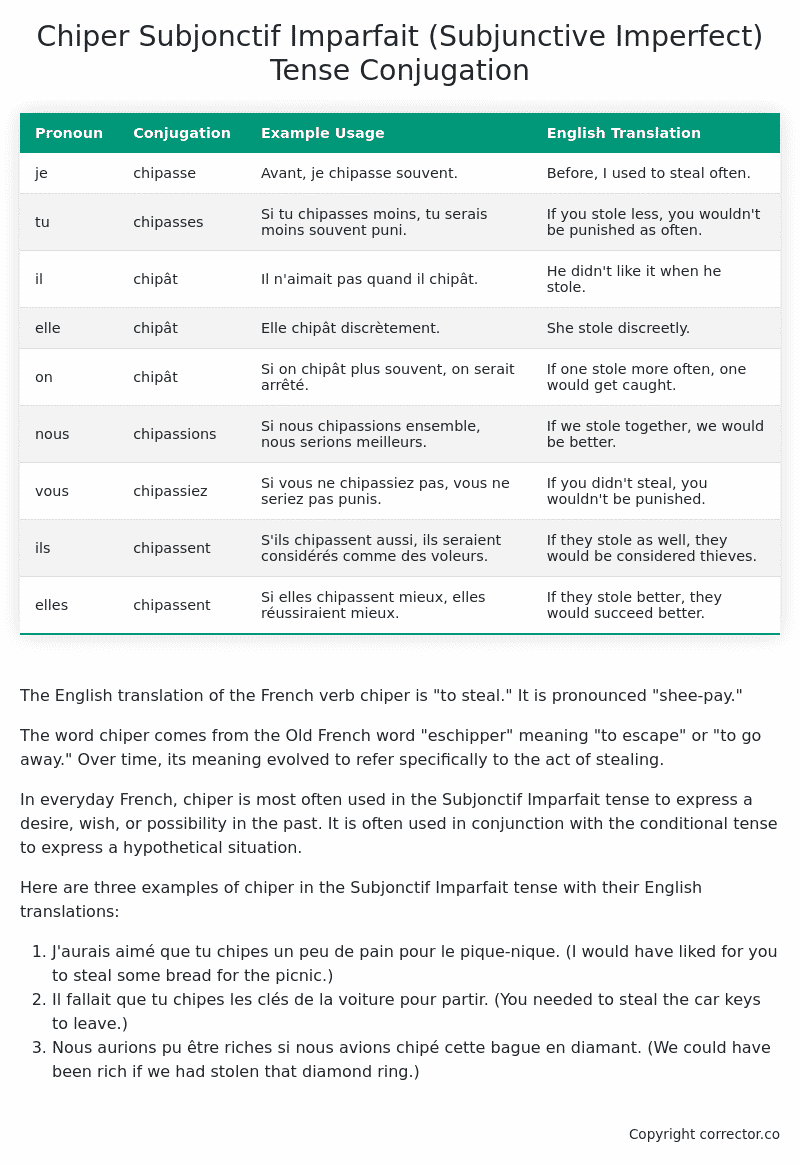Subjonctif Imparfait (Subjunctive Imperfect) Tense Conjugation of the French Verb chiper
Introduction to the verb chiper
The English translation of the French verb chiper is “to steal.” It is pronounced “shee-pay.”
The word chiper comes from the Old French word “eschipper” meaning “to escape” or “to go away.” Over time, its meaning evolved to refer specifically to the act of stealing.
In everyday French, chiper is most often used in the Subjonctif Imparfait tense to express a desire, wish, or possibility in the past. It is often used in conjunction with the conditional tense to express a hypothetical situation.
Here are three examples of chiper in the Subjonctif Imparfait tense with their English translations:
- J’aurais aimé que tu chipes un peu de pain pour le pique-nique. (I would have liked for you to steal some bread for the picnic.)
- Il fallait que tu chipes les clés de la voiture pour partir. (You needed to steal the car keys to leave.)
- Nous aurions pu être riches si nous avions chipé cette bague en diamant. (We could have been rich if we had stolen that diamond ring.)
Table of the Subjonctif Imparfait (Subjunctive Imperfect) Tense Conjugation of chiper
| Pronoun | Conjugation | Example Usage | English Translation |
|---|---|---|---|
| je | chipasse | Avant, je chipasse souvent. | Before, I used to steal often. |
| tu | chipasses | Si tu chipasses moins, tu serais moins souvent puni. | If you stole less, you wouldn’t be punished as often. |
| il | chipât | Il n’aimait pas quand il chipât. | He didn’t like it when he stole. |
| elle | chipât | Elle chipât discrètement. | She stole discreetly. |
| on | chipât | Si on chipât plus souvent, on serait arrêté. | If one stole more often, one would get caught. |
| nous | chipassions | Si nous chipassions ensemble, nous serions meilleurs. | If we stole together, we would be better. |
| vous | chipassiez | Si vous ne chipassiez pas, vous ne seriez pas punis. | If you didn’t steal, you wouldn’t be punished. |
| ils | chipassent | S’ils chipassent aussi, ils seraient considérés comme des voleurs. | If they stole as well, they would be considered thieves. |
| elles | chipassent | Si elles chipassent mieux, elles réussiraient mieux. | If they stole better, they would succeed better. |
Other Conjugations for Chiper.
Le Present (Present Tense) Conjugation of the French Verb chiper
Imparfait (Imperfect) Tense Conjugation of the French Verb chiper
Passé Simple (Simple Past) Tense Conjugation of the French Verb chiper
Passé Composé (Present Perfect) Tense Conjugation of the French Verb chiper
Futur Simple (Simple Future) Tense Conjugation of the French Verb chiper
Futur Proche (Near Future) Tense Conjugation of the French Verb chiper
Plus-que-parfait (Pluperfect) Tense Conjugation of the French Verb chiper
Passé Antérieur (Past Anterior) Tense Conjugation of the French Verb chiper
Futur Antérieur (Future Anterior) Tense Conjugation of the French Verb chiper
Subjonctif Présent (Subjunctive Present) Tense Conjugation of the French Verb chiper
Subjonctif Passé (Subjunctive Past) Tense Conjugation of the French Verb chiper
Subjonctif Imparfait (Subjunctive Imperfect) Tense Conjugation of the French Verb chiper (this article)
Subjonctif Plus-que-parfait (Subjunctive Pluperfect) Tense Conjugation of the French Verb chiper
Conditionnel Présent (Conditional Present) Tense Conjugation of the French Verb chiper
Conditionnel Passé (Conditional Past) Tense Conjugation of the French Verb chiper
L’impératif Présent (Imperative Present) Tense Conjugation of the French Verb chiper
L’infinitif Présent (Infinitive Present) Tense Conjugation of the French Verb chiper
Struggling with French verbs or the language in general? Why not use our free French Grammar Checker – no registration required!
Get a FREE Download Study Sheet of this Conjugation 🔥
Simply right click the image below, click “save image” and get your free reference for the chiper Subjonctif Imparfait tense conjugation!

Chiper – About the French Subjonctif Imparfait (Subjunctive Imperfect) Tense
Formation
Common Everyday Usage Patterns
Interactions with Other Tenses
Subjonctif Présent
Indicatif Passé Composé
Conditional
Conditional Perfect
Summary
I hope you enjoyed this article on the verb chiper. Still in a learning mood? Check out another TOTALLY random French verb conjugation!


